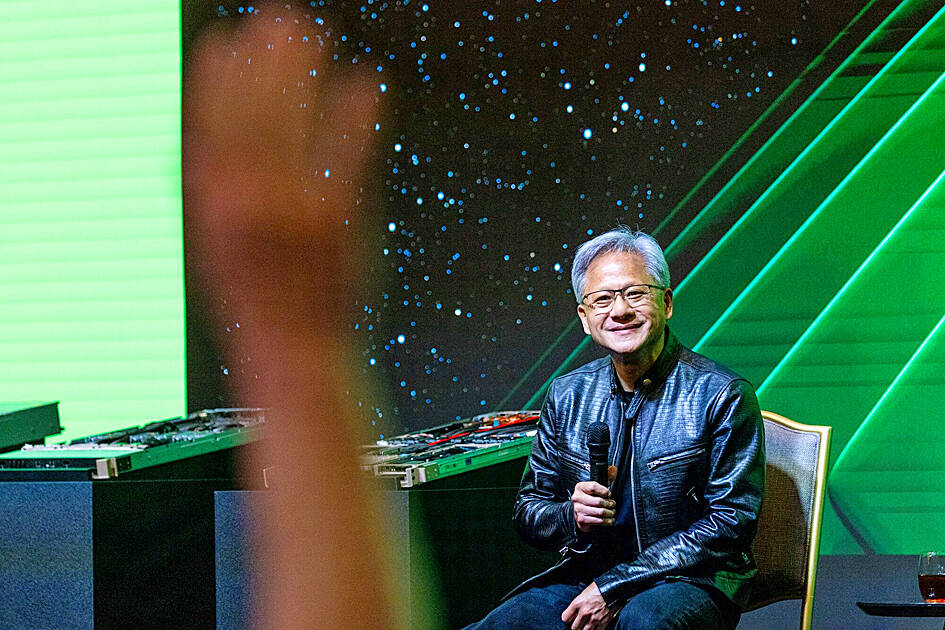Artificial intelligence (AI) chip giant Nvidia Corp yesterday said it is working on a number of new investments in Taiwan, including a second supercomputer center and possibly a corporate headquarters, given the company’s strong ties to the local semiconductor ecosystem.
Nvidia plans to build a supercomputer center like the “Taipei-1” project in Kaohsiung, CEO Jensen Huang (黃仁勳) said at a news conference in Taipei.
No final decision about the location has been made yet, he said.

Photo: Annabelle Chih, Bloomberg
Nvidia is also considering setting up headquarters in Taiwan, he said.
“If you can find me a nice plot of land, I can build a headquarters here in Taipei,” Huang said, adding that Nvidia employs hundreds of workers in Taipei and nearby areas.
The strong local ecosystem is one of the major factors behind Nvidia’s decision to invest more in Taiwan, Huang said.
For instance, Taiwan Semiconductor Manufacturing Co (TSMC, 台積電) is a significant partner of Nvidia, given the chipmaker’s advanced manufacturing technology and chip-on-wafer-on-substrate (CoWoS) packaging technology, as well as its good work ethic and flexibility, he said.
Taiwan also has “incredible” chip testing house and hardware system makers from Foxconn Technology Group (富士康科技集團) to Quanta Computer Inc (廣達電腦) and Wiwynn Corp (緯穎科技) and a lot more, he said.
Huang on Monday night said that Nvidia planned to recruit about 1,000 engineers in Taiwan over a five-year period for chip design, system design and software engineering.
The company has already built a significant AI team in Taiwan and plans to build a data center here as the nation’s expertise in AI research is very good, he said.

CHAOS: Iranians took to the streets playing celebratory music after reports of Khamenei’s death on Saturday, while mourners also gathered in Tehran yesterday Iranian Supreme Leader Ayatollah Ali Khamenei was killed in a major attack on Iran launched by Israel and the US, throwing the future of the Islamic republic into doubt and raising the risk of regional instability. Iranian state television and the state-run IRNA news agency announced the 86-year-old’s death early yesterday. US President Donald Trump said it gave Iranians their “greatest chance” to “take back” their country. The announcements came after a joint US and Israeli aerial bombardment that targeted Iranian military and governmental sites. Trump said the “heavy and pinpoint bombing” would continue through the week or as long

TRUST: The KMT said it respected the US’ timing and considerations, and hoped it would continue to honor its commitments to helping Taiwan bolster its defenses and deterrence US President Donald Trump is delaying a multibillion-dollar arms sale to Taiwan to ensure his visit to Beijing is successful, a New York Times report said. The weapons sales package has stalled in the US Department of State, the report said, citing US officials it did not identify. The White House has told agencies not to push forward ahead of Trump’s meeting with Chinese President Xi Jinping (習近平), it said. The two last month held a phone call to discuss trade and geopolitical flashpoints ahead of the summit. Xi raised the Taiwan issue and urged the US to handle arms sales to

BIG SPENDERS: Foreign investors bought the most Taiwan equities since 2005, signaling confidence that an AI boom would continue to benefit chipmakers Taiwan Semiconductor Manufacturing Co’s (TSMC, 台積電) market capitalization swelled to US$2 trillion for the first time following a 4.25 percent rally in its American depositary receipts (ADR) overnight, putting the world’s biggest contract chipmaker sixth on the list of the world’s biggest companies by market capitalization, just behind Amazon.com Inc. The site CompaniesMarketcap.com ranked TSMC ahead of Saudi Aramco and Meta Platforms Inc. The Taiwanese company’s ADRs on Tuesday surged to US$385.75 on the New York Stock Exchange, as strong demand for artificial intelligence (AI) applications led to chip supply constraints and boost revenue growth to record-breaking levels. Each TSMC ADR represents

State-run CPC Corp, Taiwan (CPC, 台灣中油) yesterday said that it had confirmed on Saturday night with its liquefied natural gas (LNG) and crude oil suppliers that shipments are proceeding as scheduled and that domestic supplies remain unaffected. The CPC yesterday announced the gasoline and diesel prices will rise by NT$0.2 and NT$0.4 per liter, respectively, starting Monday, citing Middle East tensions and blizzards in the eastern United States. CPC also iterated it has been reducing the proportion of crude oil imports from the Middle East and diversifying its supply sources in the past few years in response to geopolitical risks, expanding